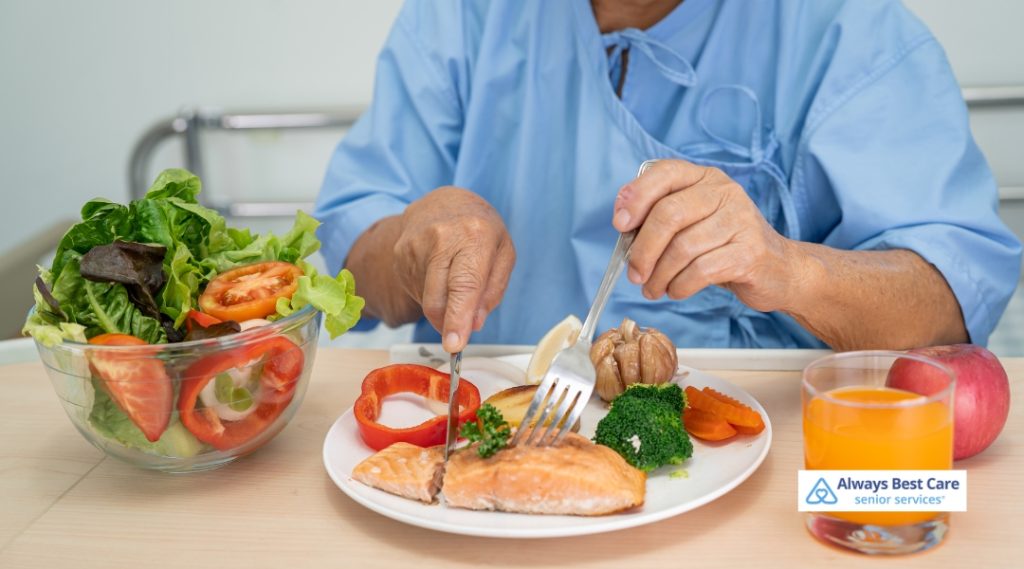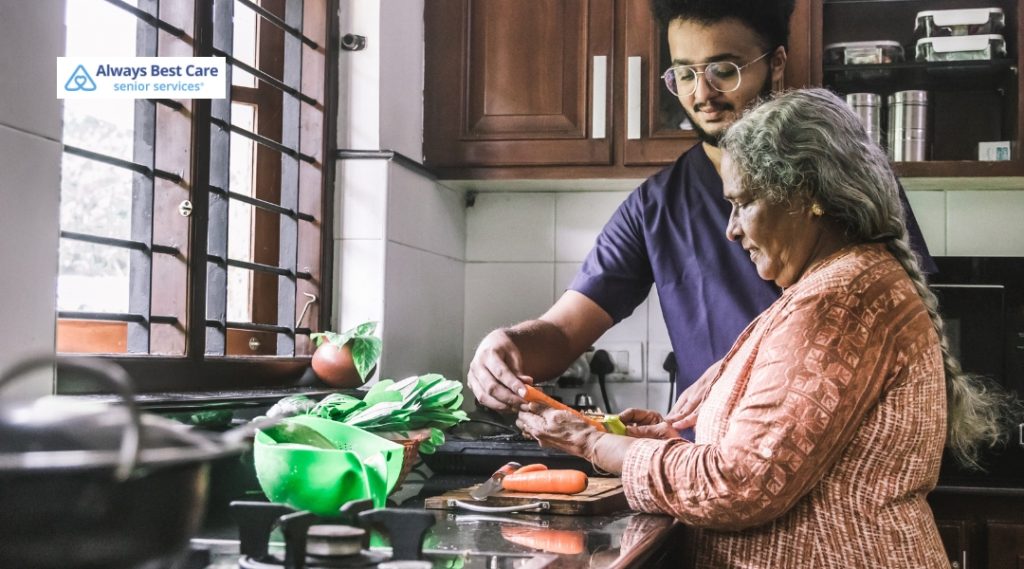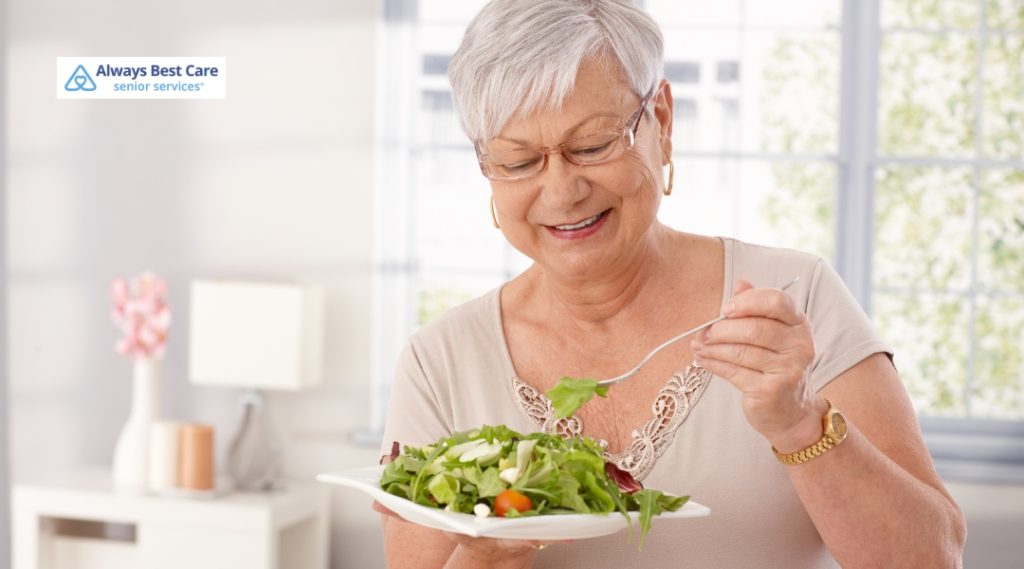Boosting Appetite in Seniors: A Recipe for Healthy Aging

As we age, maintaining a healthy appetite can become a challenge. Many seniors face a decline in appetite due to various factors, including changes in taste and smell, medication side effects, dental issues, or even feelings of loneliness.
If left unchecked, this can lead to malnutrition, weight loss, and decreased energy levels, ultimately affecting their independence and quality of life. So, how can we help our aging loved ones regain their interest in food and ensure they’re getting the nutrients they need?
What you will learn:
- The most common causes of appetite loss in seniors.
- Practical strategies to make meals more appealing and enjoyable for seniors.
- Approaches to support healthy eating.
Table of Contents
Understanding the Underlying Causes
Before we can fix the problem, it’s crucial to understand why our seniors might not be eating well. Common reasons include:
- Medication side effects: Nausea or dry mouth from certain medications.
- Dental issues: Ill-fitting dentures or mouth pain.
- Difficulty chewing or swallowing: Due to dental problems or health conditions.
- Emotional factors: Depression, isolation, or grief.
- Chronic health conditions: Conditions that affect taste or smell.
Consulting with a doctor is the first step to address any medical causes or medication-related side effects that might be impacting appetite.

Making Meals More Appealing
Seniors are more likely to eat when food looks and smells good. Here are some tips to make meals more appealing:
- Visual appeal: Use colorful fruits and vegetables, and serve food on attractive plates.
- Flavor boost: Add herbs and spices to enhance flavor without excess salt.
- Ambiance: Soft lighting and pleasant background music can create a warm atmosphere.
Serving Smaller, More Frequent Meals
Large meals can be overwhelming for those with smaller appetites. Instead, try:
- Smaller portions: Offer three small meals and two to three snacks throughout the day.
- Nutrient-dense snacks: Yogurt, smoothies, cheese, or nuts can provide essential calories and nutrients.

Eating Together
Eating is often a social activity, and many seniors lose interest in food when they’re eating alone. Sharing meals with your loved one, even just once or twice a week, can make a big difference. If you can’t be there regularly, arrange for other family members, friends, or a caregiver to join them.
Making Eating Easier
For many seniors, chewing and swallowing can become challenging due to dental issues, muscle weakness, or certain health conditions. These difficulties can make mealtimes frustrating and even risky if choking becomes a concern. Fortunately, there are practical ways to make eating easier and more enjoyable.
Soft Foods Are Your Friend
Choosing soft, easy-to-chew foods can reduce discomfort and help seniors get the nutrients they need without strain. Options like scrambled eggs, creamy mashed potatoes, warm oatmeal, and hearty soups provide both nutrition and comfort. These foods are gentle on sensitive mouths and often easier to swallow, making mealtimes less stressful.
Ensuring Proper Denture Fit
Poorly fitting dentures can cause pain, sores, and difficulty chewing, which can discourage eating. It’s important to regularly check that dentures fit properly and address any discomfort right away. A simple visit to the dentist can adjust or reline dentures, helping seniors regain confidence and ease while eating.
Adjusting Food Textures and Temperatures
Sometimes, tweaking the texture or temperature of foods can make a big difference. For example, slightly warming foods can help enhance flavors and make swallowing smoother, while some seniors might prefer cooler textures to soothe tender mouths. Pureeing or chopping foods into smaller pieces can also improve safety and comfort during meals.
By focusing on these adjustments, caregivers and family members can help seniors enjoy their food without pain or difficulty, encouraging better nutrition and a more positive mealtime experience.

Planning Ahead and Getting Creative
Meal planning can eliminate stress and encourage variety. Involve your loved one in choosing meals and groceries so they feel more engaged. Preparing meals ahead of time, trying new recipes, and incorporating favorite comfort foods can all help renew their interest in eating.
How We Can Help
At Always Best Care of Irvine, we understand that helping a senior maintain good nutrition doesn’t have to fall entirely on your shoulders. Our experienced caregivers can assist with meal planning, grocery shopping, and preparing tasty, nutritious meals tailored to your loved one’s preferences and dietary needs.
Whether it’s encouraging hydration, adjusting meals for swallowing difficulties, or simply providing companionship during mealtime, we’re here to help make eating a positive experience again.

FAQ
Q: What are the common reasons for decreased appetite in seniors?
A: Common reasons include medication side effects, dental issues, difficulty chewing or swallowing, emotional factors like depression or isolation, and chronic health conditions.
Q: How can I make meals more appealing to seniors?
A: Use colorful fruits and vegetables, serve food on attractive plates, add herbs and spices for flavor, and create a warm atmosphere with soft lighting and music.
Q: What types of meals are best for seniors with difficulty chewing?
A: Focus on soft, easy-to-eat foods like scrambled eggs, mashed potatoes, oatmeal, or soups.
Ready to Help Your Loved One Enjoy Mealtime Again?
If your aging loved one is struggling with appetite loss or needs support with daily routines, contact Always Best Care of Irvine at (949) 705-6501 to schedule a care consultation. Our compassionate caregivers are here to support health, wellness, and independence—starting right at the kitchen table.





